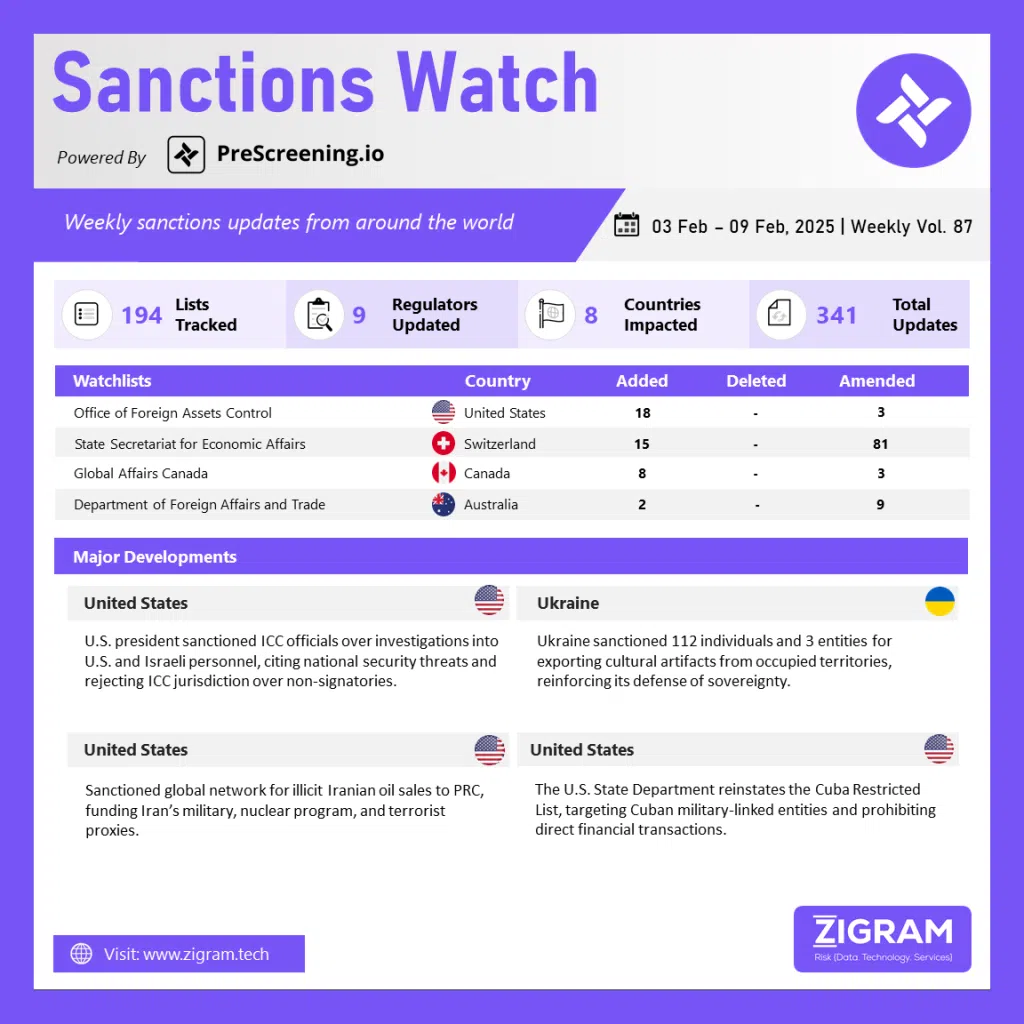Sanctions Watch Vol 87
In the latest edition of our Sanctions Watch weekly digest, we present significant updates on sanction watchlists and regulatory developments.
1. President Exercises Executive Authority to Enforce Economic and National Security Measures to Impose Sanctions on World Court
President Donald J. Trump issued an Executive Order imposing sanctions on officials of the International Criminal Court (ICC). The order was based on authorities granted under the International Emergency Economic Powers Act (IEEPA) and the National Emergencies Act (NEA). The U.S. government declared the ICC’s actions an “unusual and extraordinary threat” to national security and foreign policy.
The sanctions specifically target ICC officials involved in investigations against U.S. personnel and close allies, particularly Israel. This includes blocking the property and assets of individuals engaging in or supporting ICC prosecutions without U.S. consent. The order also restricts the entry of ICC officials and their immediate family members into the United States.
The Executive Order cites the ICC’s issuance of arrest warrants against Israeli Prime Minister Benjamin Netanyahu and former Defense Minister Yoav Gallant as unjustified. The U.S. rejects the ICC’s jurisdiction over non-signatories to the Rome Statute, reaffirming its position under the 2002 American Servicemembers’ Protection Act.
The order mandates enforcement by the Treasury and State Departments, ensuring compliance through financial restrictions and visa bans. The U.S. calls on allies to oppose ICC actions, reinforcing national sovereignty and military protection.
2. Ukraine Imposes Sanctions on 112 Individuals and 3 Entities
On February 6, 2025, Ukraine expanded its sanctions list by adding 112 individuals and 3 entities through Presidential Decrees No. 67/2025 and No. 68/2025. The sanctioned entities are museum funds that, according to Ukraine, received permits from the Russian government to export cultural artifacts from occupied territories. This move reflects Ukraine’s ongoing efforts to impose restrictive measures in response to actions it deems threatening to its sovereignty and territorial integrity.
3. U.S. Treasury Expands Sanctions to Disrupt Iranian Oil Network Funding Terrorism
The U.S. Department of the Treasury’s Office of Foreign Assets Control (OFAC) has sanctioned a global network facilitating Iranian oil shipments to the People’s Republic of China (PRC). The network, linked to Iran’s Armed Forces General Staff and front company Sepehr Energy, generates billions in revenue used to fund Iran’s military and terrorist proxies.
The designations target entities in the PRC, India, UAE, and Seychelles, as well as several oil tankers. OFAC also sanctioned crew management firm Marshal Ship Management Private Limited and individuals involved in falsifying shipping documents.
Key vessels identified include the sanctioned tanker SIRI (formerly ANTHEA), which concealed its identity to evade restrictions. Companies operating the OXIS and GIOIOSA tankers were also designated. Additionally, Panama-flagged CH BILLION and Hong Kong-flagged STAR FOREST were identified for transporting Iranian oil.
As a result, all U.S.-linked assets of designated entities are blocked, and secondary sanctions may apply to foreign financial institutions facilitating these transactions. The action aligns with Executive Orders 13224 and 13902, reinforcing U.S. economic pressure on Iran.
3. U.S. Department of State Updates Cuba Restricted List with Reinstatement and New Designation
On February 6, 2025, the U.S. Department of State reinstated the Cuba Restricted List (CRL), reversing the Biden Administration’s revocation of President Trump’s National Security Presidential Memorandum 5 of 2017. The CRL identifies entities and subentities controlled by or acting on behalf of the Cuban military, intelligence, or security services. Additionally, a Cuban remittance provider was added to the CRL, effective March 10, 2025. The reinstated list targets key sectors of Cuba’s economy, including real estate, tourism, retail, and hospitality. It includes numerous hotels and several government-affiliated holding companies.
The Cuban Assets Control Regulations prohibit individuals under U.S. jurisdiction from engaging in direct financial transactions with listed parties. Such transactions include wire transfers, credit card payments, checks, or cash transfers. This decision underscores the U.S. government’s ongoing efforts to restrict financial dealings with the Cuban government and entities closely linked to its security services.
Know more about the product: PreScreening.io
Click here to book a free demo.
Sanctions Watch is a weekly recap of events and news related to sanctions around the world.
- #OFAC
- #TrumpSanctions
- #ICCSanctions
- #USForeignPolicy
- #IranSanctions
- #InternationalJustice
- #WarCrimes
- #IranOilTrade
- #NationalSecurity
- #EconomicSanctions
